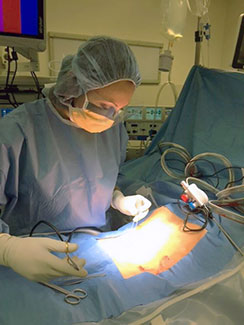Profile: Fogarty Fellow Dr Lily Gutnik boosts breast cancer screening in Malawi
July / August 2017 | Volume 16, Issue 4

Image courtesy of Dr. Lily Gutnik
When Dr. Lily Gutnik applied for a Fulbright-Fogarty fellowship in public health, she hoped to be able to rectify what she calls "a horrible injustice" - that a woman's chances of surviving breast cancer depend in large part on where she lives.
"In developed countries, up to 90 percent of women diagnosed with breast cancer survive, whereas in developing countries, up to 90 percent of women with the disease die," Gutnik explains.
Fulbright-Fogarty fellows and participants in Fogarty's Global Health Program for Fellows and Scholars receive support for a year of mentored research in a low-resource setting. Gutnik spent her fellowship in the southern African nation of Malawi, studying how to change perceptions of breast cancer and increase the number of women who are screened for the disease.
She knew she would have to take a cost-effective approach to the problem because Malawi is one of the poorest countries in the world and doesn't have the means to provide nationwide breast cancer screening, which has improved early detection in developed nations and lowered the mortality rate. She also knew she would have to tackle the misconceptions about cancer that abound in the country, and that she would have to do both in a way that sits well with Malawians' culture and their limited resources.
Working with former Fogarty Fellow, Dr. Satish Gopal, who is head of the University of North Carolina's Project-Malawi cancer group, Gutnik trained four Malawian women with no health care background - including one breast cancer survivor - to do breast exams and give educational talks on breast cancer in clinic waiting rooms. "More than 4,000 people heard the talks," Gutnik said. "Many were surprised to hear that breast cancer isn't caused by putting money or a cell phone in a bra, and that it cannot be passed to a baby through breastfeeding."
Over the course of a year, the trained laywomen examined more than 1,000 patients, referring 67 whose results were abnormal to Gutnik and a colleague. Most - but not all - of the referred patients attended follow-up visits, and of them, 13 underwent pathologic sampling of a breast lesion. Two women who tested positive for cytologic dysplasia stand out in Gutnik's memory because they refused to undergo further tests, highlighting the social and psychological pressures that prevent many Malawians from seeking care.
Spending a year in Malawi helped Gutnik better understand some of the myriad global health issues that need to be addressed in low-income countries. "Screening and awareness are hugely important, but we also need to educate the providers. Few even recognize cancer, and they send women who come to them seeking treatment home with antibiotics and painkillers. It's no good raising awareness and having women come in for screening, only to get mismanaged," she said.
The Fogarty fellowship also helped cement Gutnik's philosophy on global health. "My year in Malawi allowed me to spend a long time on the ground, dealing with day-to-day challenges, being entrenched in the local culture. The fellowship made me realize that I want to devote a large part of my career to research and capacity building in developing countries."
Gutnik has published several papers and made numerous presentations about her study. Although she admits there's a long way to go before Malawi has nationwide screening and people stop thinking of cancer as a death sentence, Gutnik believes her Fogarty-supported work helped get the country on the right track in the fight against breast cancer.
"People were asking us if they could bring a friend to be screened, and men who heard the waiting room talks were asking to bring in their wives," she said. "Using a simple, affordable model, we changed people's minds and started making a dent in the taboos about cancer."
More Information
To view Adobe PDF files,
download current, free accessible plug-ins from Adobe's website.